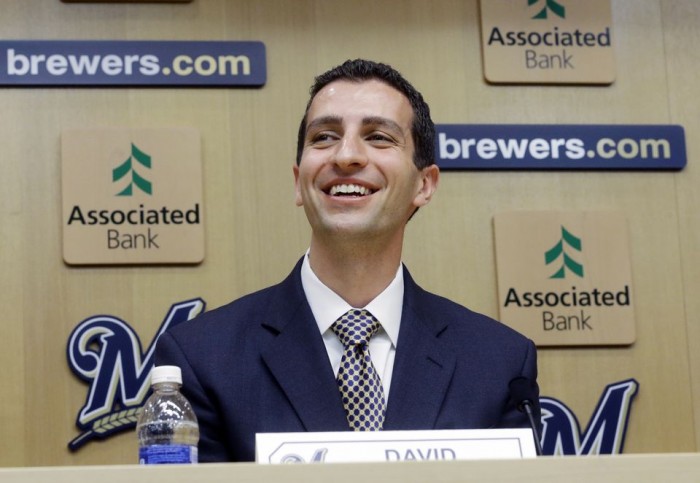I’m not sure exactly when the Philadelphia 76ers are supposed to start winning games. Saturday’s loss to the Spurs pushed the 76ers to 0-10 for the second straight season. Last year’s 76ers needed didn’t win until their 18th game en route to an 18-64 finish. It was the second year under Sam Hinkie and his Process, and the second year his Sixers failed to win 20 games. If things go according to plan again this year, it will be three such seasons in a row for the laughingstock of the NBA.
The utterly hopeless Sixers have been the greatest symbol of the tanking that is so en vogue in professional sports right now. In baseball, as Evan Drellich discussed and reported in detail for the Houston Chronicle, last year’s success stories in Houston and Chicago are adding fuel to the tanking fire. The Brewers with former Astros executive David Stearns at the helm could be among the next wave of teams to undertake the strategy.
It’s hard to argue with how good the Astros and Cubs got so quickly. It’s also hard to make an argument for bad teams going wild in the free-agent market. Deals like Carlos Lee’s six-year, $100 million and other ill-advised free agent signings (see also: Woody Williams, Pedro Feliz, Kazuo Matsui) were responsible for the Astros becoming a 100-loss team in the first place. Moral victories are no good if they take away from the resources to build a future, and bad contracts hurt doubly on teams already light on talent, money, or both.
But this is not rocket science. The only people who believe throwing money at old free agents will fix a bad team are owners with insatiable egos. The choice between a full tank and reckless spending is a false dichotomy. As new Phillies GM Matt Klentak told Drellich, “I think the beauty of baseball — this is not to get overly philosophical — is that there is no one way to do it.” Look at the teams that have won in the past decade — the White Sox, Cardinals, Red Sox, Phillies, Yankees, Giants, and Royals — and you’ll see teams built off vastly different strategies in the free agent market and vastly different philosophies. The only constant is that these teams all somehow spent major resources to get talent, whether it was bought, traded for, drafted, or (usually) a mixture of all three.
The only thing tanking can be indisputably proven to do, other than lose games by the truckload, is lower payroll. The Astros, despite playing in a medium-sized market, have been in the bottom three in payroll since 2012. They paid just over $22,000,000 to players in 2013 — less than $1,000,000 per roster spot. The Cubs slashed nearly $40,000,000 off their payroll between 2011 and 2012, after Theo Epstein and Jed Hoyer took major roles in the Cubs front office. The 76ers have flirted with the NBA’s salary floor since Hinkie has taken over, to the point where the NBA Players Association has started investigations into their salary practices.
“The messaging was always hard,” Hoyer told Drellich. And really, that’s all the new tanking wave is. How do you sell a team that everybody knows has no chance? You sell a future, something fueled by a vague notion of smartness, a process that can be pointed to as the losses pile up. Sell each loss as a critical step on the path to victory, sell each rebuilding season as a chance for fans to get in before it was cool, and sell belief in the process as a way to be smart just like the visionaries guiding the ship from the front office.
The Cubs and Astros have made it look like it can work, although they will have to sustain their success and turn playoff appearances into pennants before their efforts truly reach the finish line. The 76ers, meanwhile, are mired in the worst case scenario, with injuries to draft picks like Joel Embiid pushing the target contention date back further and further and further. 76ers fans have been waiting years for good basketball, and it looks they’ll have to keep waiting.
Brewers fans, if Stearns chooses to follow the same path Jeff Luhnow did in Houston, may be facing the same sort of dry spell. If he does, we will surely hear plenty about how pragmatic his strategy is, how the process must be trusted, and how it is his youthful, analytical intelligence at work. That’s all fine and good, if that’s what keeps you going as a baseball fan. But remember what Hoyer said. This is messaging. The real product tanking teams are selling is bad, cheap baseball, whatever else it is you may want to see.

3 comments on “Where Tanking Meets Messaging”